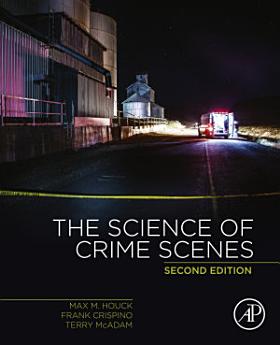The Science of Crime Scenes: Edition 2
Jul 2017 · Academic Press
5.0star
1 reviewreport
Ebook
460
Pages
family_home
Eligible
info
reportRatings and reviews aren’t verified Learn More
About this ebook
The Science of Crime Scenes, Second Edition offers a science-based approach to crime scenes, emphasizing that understanding is more important than simply knowing. Without sacrificing technical details, the book adds significantly to the philosophy and theory of crime scene science. This new edition addresses the science behind the scenes and demonstrates the latest methods and technologies with updated figures and images. It covers the philosophy of the crime scene, the personnel involved at a scene (including the media), the detection of criminal traces and their reconstruction, and special crime scenes, such as mass disasters and terroristic events. Written by an international trio of authors with decades of crime scene experience, this book is the next generation of crime scene textbooks. This volume will serve both as a textbook for forensic programs, and as an excellent reference for forensic practitioners and crime scene technicians with science backgrounds. - Includes in-depth coverage of disasters and mass murder, terror crime scenes and CBRN (Chemical, biological, radioactive and nuclear) – topics not covered in any other text - Includes an instructor site with lecture slides, images and links to resources for teaching and training
Ratings and reviews
5.0
1 review
About the author
Dr. Max M. Houck is an international forensic expert with over 25 years of experience. Houck has experience in the private sector, academia, local government, and worked at the Federal Bureau of Investigation Laboratory Division. He has worked as a forensic anthropologist, a trace evidence analyst, a researcher, and has managed millions of dollars in grants and awards. Most recently, he was the inaugural Director of the Department of Forensic Sciences in Washington, D.C., overseeing 150 employees and managing the forensic science laboratory, the public health laboratory, and crime scene sciences for the nation's capital. Houck has worked on a number of mass casualty scenes, including the Branch Davidian Investigation and the September 11, 2001 attack on the Pentagon. Widely published, Houck has dozens of peer-reviewed journal articles and is the author and editor of numerous books. He is co-author of the best-selling Fundamentals of Forensic Science, Science of Crime Scenes, and Success with Expert Testimony, among others. He is the editor of the Advanced Forensic Science series of books. Houck is also founding co-editor of Forensic Science Policy and Management (the official journal of ASCLD), the only journal that addresses the management, policy, and administration of forensic science. Houck has served on numerous committees, including for the National Academies of Science, NIST, Interpol, The Royal Society, the Director of the FBI, and the White House. He is a popular public speaker and has given presentations at NASA, the Max Planck Institute, an Oxford Roundtable, as well as keynote talks at numerous international conferences. Houck has taught at several universities, including West Virginia University and University of Tampa. His research topics include management, leadership, and policy implications for forensic organizations. Houck has a Bachelors and Masters degree in anthropology from Michigan State University. He received his Ph.D. in Applied Chemistry Summa Cum Laude from Curtin University in Perth, Australia. He is a Fellow of the Royal Society of Chemistry.MPhil and PhD from the University of Lausanne, Frank Crispino is a former Cadet of the French Air Force Academy and a retired Colonel of the French Gendarmerie, qualified from the French War College (the Gendarmerie is a French police with a military status). During his law enforcement career, he served as:- Head of two Gendarmerie regional criminal investigations departments in charge of investigating serious, organized international crimes and preventing terrorist incidents;- Deputy chief of the anti-terrorism office at the General Directorate of the French Gendarmerie in Paris.- Head of the forensic anthropology department (1993-1997) and the fingerprint department (1997-1999) at the Institut de Recherche Criminelle de la Gendarmerie Nationale (IRCGN – Forensic Lab of the Gendarmerie).- Forensic adviser of the Brigadier General, head of the forensic assets of the Gendarmerie, in charge of proposing new strategies to develop forensic intelligence.From February 1999 to July 2002 he provided forensic capacities to the Palestinian Authority granted by the European Union within the Oslo Agreements, and became Scientific and Forensic Adviser of the European Union Special Adviser Office (EUSAO) in the West Bank and the Gaza Strip on counter-terrorism. He left the Middle East after the destruction of the Palestinian forensic assets in 2002.In the summer of 2012, prof. Frank Crispino joined the University of Quebec in Trois-Rivières, Canada, to launch the first forensic academic programme in this French Canadian Province, aiming at educating forensic scientists dedicated to security traces investigation and analysis. He is the author of about 50 papers in various forensic and security journal.
Rate this ebook
Tell us what you think.
Reading information
Smartphones and tablets
Install the Google Play Books app for Android and iPad/iPhone. It syncs automatically with your account and allows you to read online or offline wherever you are.
Laptops and computers
You can listen to audiobooks purchased on Google Play using your computer's web browser.
eReaders and other devices
To read on e-ink devices like Kobo eReaders, you'll need to download a file and transfer it to your device. Follow the detailed Help Center instructions to transfer the files to supported eReaders.






